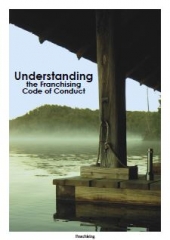
Below is a summary of our guide “Understanding the Franchising Code of Conduct”. Download the full guide.
Franchisors and franchisees trading in Australia are all subject to the regulations contained in the Franchising Code of Conduct. This is a mandatory code that comes under the Competition and Consumer Act 2010 and the Australian Competition and Consumer Commission is the regulatory body which will investigate alleged breaches.
5 things about the franchising code
Dr Michael Schaper, deputy chairman ACCC, highlights the key points for potential franchisees:
- The Code covers franchise agreements, as defined by the Code, regardless of what they are called.
- You have rights under the Code both before and after you buy a franchise.
- You are entitled to a disclosure document and a franchise agreement – don’t hand over any money or sign anything until you’ve read these documents carefully, received professional advice and spoken to other franchisees.
- The Code gives you a cooling off period and rules that apply when a franchisor intends to terminate your agreement.
- The Code contains a cost-effective dispute resolution procedure.
When does the Code apply?
It doesn’t matter whether or not a franchise business calls itself a franchise, if there is an agreement that meets the Code’s definition it is subject to the regulations.
When all four of these elements feature, the business is legally considered a franchise:
- There is a written, oral or implied agreement.
- There is an existing system or suggested marketing plan under the control of a franchisor or associate.
- It is a business operating under a trademark or symbol.
- There is a fee to be paid to the franchisor by the franchisee (this could be a royalty or a training fee).
Under the Code of Conduct there is a get-out clause for brand new franchisees who are legally entitled to a week-long cooling-off period, says Esther Gutnick, senior associate at MST Lawyers.
“You may terminate a franchise agreement within seven days after either entering into the agreement or making a payment under it, whichever occurs earlier,” she advises.
The Code of Conduct stipulates that if a franchisee exercises his or her cooling-off rights, the franchisor must refund all payments made by the franchisee under the agreement within 14 days, she says.

